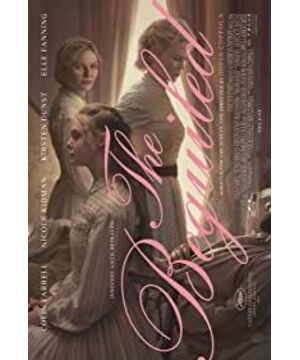"Gong Douju" is actually a very peculiar genre. The beauties fight each other in order to get the favor of men, in the name of love. The large-scale battle dramas that have prevailed in China in recent years, such as the scheming of beauty, the biography of Zhen Huan, the startling step by step, and the biography of Miyue, can hardly escape even under the banner of female self-improvement.
But under this peony flower, it made my eyes shine.
The story is about the American Civil War background, a southern women’s boarding school took in McBurney, a handsome wounded soldier from the north, so the female teachers and female students in the school launched a trilogy of rescue, contention, and revenge. The movie-watching experience is unique, not because of the ups and downs of the plot, but because of the feeling, mood and aftertaste left by the story. If it is said that the story of suspense reasoning is reversed, many movies have achieved the ultimate, but this film is different from the general fast-paced drama, its advantage lies in the female perspective of director Sofia Coppolad, the most prominent of which is The two themes of'heterosexual relationship' and'same-sex relationship' appear to be different from the male perspective. So after watching the movie carefully, I can always figure out some of the deep meaning.
The tension in the relationship between the opposite sex is an important aspect of Gongdou Opera. A beautiful man and many beautiful women are themselves an exciting story. This drama is different from many rose-colored Gongdou stories in that the women do not just come up and fall in love with the male protagonist without thinking. The story begins with a young girl, Amy, who rescues the wounded, and then begins to tell how the women in the school cared for the wounded in every possible way. Precisely because the story starts with a woman's kindness to help the weak, what she wanted to express at the beginning was the sympathy, compassion and consideration of women for men. This is the first part. The plot turns to Nicole Kidman's principal Ms. Martha, who wipes McBurney's body over and over again. Through her tender but hesitant movements, impulsive and restrained expression, it is not difficult to find that there is no longer one who is lying wet on the bed. The sickly wounded, but the body of a man full of masculinity. It seems that at that moment, the relationship between the opposite sex in the story has changed. From the rescuer's care of the wounded to the mature and charming man's physical attraction to women, the women and girls in the school can't escape his evil. Charm. Seeing that the women are so easily fascinated by their flirting and flirting, so that they do their best to embrace and embrace each other, the audience is tacitly aware of the humor conveyed by the screenwriter. This part is portrayed with a degree of relaxation, and is the one with the most laughs in the theater. However, as the conflict accumulates to the peak, the ambiguous lingering of you retreating and me entering comes to an abrupt end. The male protagonist Ms. Martha sneaked into the room of the young female student played by Fanning, and was found by the jealous Edwina and fell down the stairs. Under the leadership of Ms. Martha, the women saw off one of the male protagonist's legs in revenge. The dramatic reversal is that the violent and cruel nature of the male protagonist is suddenly aroused, and he is different from the previous persona, and his constant accusations and attacks on the female school teachers and students also turn the relationship between the opposite sex into hatred. The women finally decided to retaliate together and use poison to finally end the fate of the male lead. The man who seemed to be full of charm collapsed and ended his life. The conflict between the opposite sex was pushed to the extreme.
The several escalations of this kind of heterosexual relationship are accompanied by changes in the relationship between women of the same sex, which in turn deepens and advances the tension between the opposite sex. In the world where there were only women in the beginning, there were only students and teachers who performed their duties. When the male protagonist enters this closed world, the women unanimously become angels who help the weak. Men's injuries faded and began to flirt. This not only weakened the motherhood of women, but also greatly stimulated the female instinct to compete for high-quality male resources. They suddenly showed jealousy and exclusivity in their fights. After the extreme conflict, the women once again joined forces, saw off his legs, and poisoned his people, with determination and coldness on their faces. If the film implies a kind of faint darkness, it is because every transition of gender roles is so natural, but it makes people shudder through it. Reflected in the tacit tolerance between the same sex, is the seemingly romantic but fragile attraction of the opposite sex. Revenge in one go under the cooperation of women constitutes a mockery of men's self-confidence in their charm. Because the purpose of women's revenge this time is not to get the man's body and man's heart, but to confront the male's physical characteristics, and to judge life and moral judgment. This is the traditional power relationship required for dialogue through collaboration between the same sex. The darkness and evil that the film leaves to people at the end seems to come not only from the reflection on'humanity', but also from a discussion of'feminineness'.
The exploration of the female perspective in the film lies not only in the reconstruction of power relations, but also in the logical narrative of the pros and cons of'female power'. In the first part, female power is the guarantee for the recovery of the male lead, such as stitching up wounds, taking care of injuries, cooking and washing clothes, and being kind and hospitable. And these female powers were not weak at the beginning. The little girl was willing to take the risk to lead a strange man into the door, and she was also willing to carry his heavy body with her thin body. This was the side of female power willing to give. When Principal Martha was stitching up the wound, he was willing to endure the physical discomfort caused by the wound and blood stains. This was the courageous and decisive side of women's power. However, all of this forms an intertextuality with the following plot. Such feminine power can save or kill people. It was Martha who hurt his leg, and it was the same kind of bravery and decisiveness, and what killed him in the end was poison, a deadly weapon that was regarded as a female exclusive. In the face of unbalanced physical confrontation, women still have the means to hit the rocks with pebbles. In this kind of intertextual narrative, the screenwriter is interpreting the female's physical characteristics, physical skills, and mental character.
And to talk about the mushrooms that have appeared several times is obviously a metaphor. At the beginning of the film, the little girl meets the male protagonist because of mushroom picking, and in the end the male protagonist also died because of eating poisonous mushrooms. Mushrooms are an important ingredient on the western table, especially the British have a unique love for mushrooms. At the same time, because mushrooms are easy to grow after rain, they are often regarded as a symbol of endless life. The mushroom at the beginning of the film can be seen as a hint of the life energy of a woman. In the end, the women tricked the men into eating poisonous mushrooms and died. Such sanctions are undoubtedly a declaration of castration of the men. In the past, men used their male superiority to launch temptation, using the vitality of a woman who is like a mushroom, but in the end they still eat the mushroom and eat the fruit of themselves. It is the retribution of the other self who has completed the self-castration. It is said that the Poisonous Mushroom Bridge is the play of this version, which can be described as a bright spot.
This brings me to the meaning of the title The Beguiled. Translated into "under the peony flower" obviously implies the phrase "death under the peony flower, and be a happy ghost", but I always feel a little different in taste, after all, romantic ghosts always have such a hint of repentance. The English title The Beguiled is actually more subtle. The literal translation refers to being tempted. Then in such a revenge story, who is being tempted? Is it the woman who finally awakened after being tempted? Or the man who eventually died unexplainably because of being tempted? I prefer to understand this as a deliberate pun, which I want to bring about simultaneous reflection from the perspective of both sexes.
Returning to the previous topic of "Gong Douju", this kind of story of men and women may be as simple as falling in love with the male lead and competing for the male lead. What this film offers is another possibility. How many eager spring hearts are rippling, how much coveting for male power and status, how much trust and interdependence between the same sex, and how much suspicion and confrontation between opposite sexes, among them There is a lot of tension and tight space. If you are curious about what a woman's perspective is like, you can really watch this film, perhaps you can really appreciate some of the negative aspects of "common sense" that we believe to be true.
Mountain
August 6, 2017
View more about The Beguiled reviews











